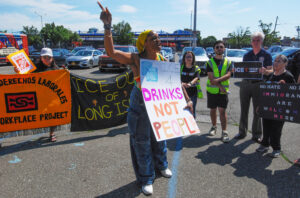By Lucas Pino
Many New York City dwellers came to Long Island seeking a change of scenery when the world went into lockdown amid the coronavirus pandemic in 2020 and 2021, and the exodus has continued since. As a result, Long Island has seen an unprecedented rise in housing prices because of increased demand.
According to reports by Rocket Homes, the median Long Island home price soared this July, even as higher interest rates on mortgages caused a slowdown in home purchases. In Nassau County, homes were selling, on average, for $668,000 — an 8.5% increase over July last year. In Suffolk County, homes were selling for about $530,000 — a 10.5% jump.
Earlier in the pandemic, homebuyers took advantage of low mortgage rates, which made paying for a home more affordable and allowed many people to make offers above asking prices, so houses came off the market quickly.
According to the National Association of Realtors, with interest rates on the rise, sales of existing homes fell 5.9% in July from the previous month. It was the sixth straight month of declines. Still, homes were selling quickly.
According to a NAR report, houses remained on the market for 14 days in July, tying June’s rate, which was a record low dating back to 2011, when the NAR began tracking such data. Eighty-two percent of homes purchased in July were on the market for less than a month.
Experts predict, however, that prices will decline soon. “…When I’ve talked to people who work actively in the real estate market, they feel that this is probably the last we’re going to see of these large numbers. It’s going to start considerably going down,” said Lisa Capri, a former real estate agent.
According to Zillow, the annual home value growth in the U.S. is expected to cool off through June 2023. As for 2022, Zillow predicts 5.46 million total sales for the year — a 10.8% decrease from last year — because of interest rate hikes.
The Federal Reserve has twice raised the interest rate by .75 percent this year, increasing its benchmark interest rate to 2.25 to 2.5% to reduce spending and thereby fight inflation to stop a looming recession. According to Freddie Mac, for the week ending July 21 this year, the average 30-year fixed-rate mortgage rate was 5.54%. At the end of 2021, it was 3.11%. Mortgage rates are expected to rise to higher levels later this year, which would directly impact home prices.
“I think you’ll see a leveling off of prices due to higher mortgage rates, and you’ll also continue to see fewer sales year over year.”
David Winzelberg, Long Island Business News
“I think you’ll see a leveling off of prices due to higher mortgage rates, and you’ll also continue to see fewer sales year over year,” said David Winzelberg, a writer for Long Island Business News, who covers real estate. He believes higher mortgage rates will put a “damper” on Long Island home sales.
“We’re definitely entering a significant recession. People are still losing jobs. The pandemic is still impacting the work environment. I just think eventually it’s going to have to settle in, and I don’t think you’re going to see these numbers,” Capri said about housing prices.
Chris McArdle, who buys homes, renovates them and then resells them, explained how the increase in mortgage rates has affected home prices. He sold his previous home about three months ago, and it was purchased in the first weekend for $40,000 over listing. He purchased his current home at the high end of the market.
“I have another house for sale, same neighborhood, same square footage, and it’s much harder to get people in because the mortgage rates are higher and people can afford less,” McArdle said.
On top of that, a declining stock market makes it that much tougher to sell, “and if you look at the websites that list houses, like Redfin and Zillow, a lot of houses are not selling and are reducing the price on houses to try to get rid of them,” he said.
The Long Island housing market is expected to return closer to normalcy by year’s end, experts said they believe. “I think you’re going to see a more normal market because it’s been a seller’s market…” Winzelberg said. “But I think you’ll see a change possibly towards the end of the year and into next year. That may still be a seller’s market, but maybe not as strong.”

It’s tough to determine when exactly housing prices on Long Island will go down. “Not having a crystal ball, we don’t know,” said John Langone, owner and broker at Richard B. Arnold Real Estate in Sea Cliff. He believes it will take time for the housing prices to decline.
“As long as there is supply and demand, as long as there are shortages of houses, [prices] won’t [drop], because people are buying [homes] now, even though interest rates have almost doubled in the past year or so,” he said.
As it stands, the future of home prices on Long Island seems a bit murky.
“I think the inventory will eventually recover. I think it’ll creep up, and I think the higher mortgage rates will have something to do with that,” Winzelberg said. Once there is more inventory, housing prices will level off or decline, and there will be fewer bidding wars, he noted.
Experts appear to agree with Winzelberg’s assessment. What is not known for certain, however, is when, or by how much, prices might fall. Only time will tell.








